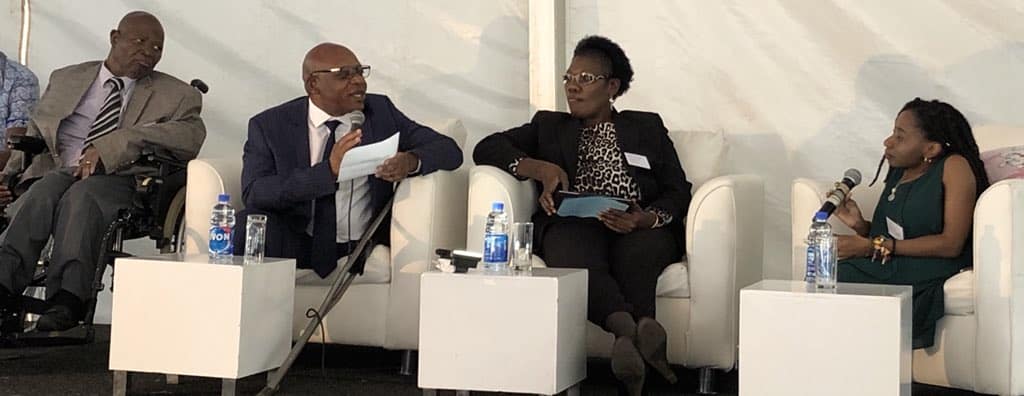By Byron Mutingwende
The British Embassy and its Department for International Development (DFID) in Zimbabwe and other stakeholders held a summit in Harare to put disability issues on the map and foster inclusivity.
The summit in Harare was a precursor to the Global Disability Summit to be held in London in the United Kingdom in July. The summit will be a major international event to raise global attention on disability.
In her welcome remarks at the summit on 17 April 2018, Dr Joanne Abbot, the Acting Head of DFID Zimbabwe revealed that disability affects nearly 1 million people of all ages, backgrounds and parts of the country.
“Globally, one in seven people in the world have a disability. That’s, one billion people living with a disability, and an estimated 80% of those are living in a developing country. 80% of women with disabilities are unemployed and children with disabilities are at three times the risk of violence.
“And here in Zimbabwe, disability affects the lives of nearly 1 million Zimbabweans, of all ages, all backgrounds, and all parts of the country. Most Zimbabweans have lived with their disability since childhood, and children with disabilities are less likely to attend school, and to progress with their education,” Dr Abbot said.
The United Kingdom in Zimbabwe pledged to make communities understand that disability is not a curse; raise the profile of invisible disability including mental health; promote equality for all people with a disability and foster inclusivity in all aspects of life.
In his testimony, Ralph Watungwa, the Chief Executive Officer of Standard Chartered Zimbabwe, born with one leg, said his condition did not deter him from excelling at school.
“Whenever there was an exam to be written, I was always the best, not only in Zimbabwe but in Africa as a whole. My biggest hero is my mother who also became disabled when I was born. Those with disabilities should work hard and be determined to improve their talents and realise their dreams.
“The pathway to economic empowerment starts with social acceptance of people’s diversity. Infrastructure at hospitals should be conducive for patients with disabilities including pregnant women and their newly born children. When extending loans, banks and other financial institutions should consider people’s capabilities to deliver and money should be reserved for people whop have a purpose for it, not one’s physical status,” Watungwa said.
He pledged to help build a database of disabled persons in Zimbabwe with the assistance of IT technicians at Standard Chartered Bank. In addition to that, he pledged $1700 for mainstreaming disability inclusion.
Prudence Mandishona, a rehabilitation technician, was left in a hut in the maize fields that was gutted by fire when she was nine months old, leaving her with burns. Since she came from a disadvantaged background, she was assisted by the Campaign for Female Education (Camfed) to acquire education and become what she is today. In that regard, she urged society to create opportunities for PWDs to realise their dreams.
Edmore Masendeke, an economist with the Reserve Bank of Zimbabwe and Founder of Endless Possibilities recounted how he was unable to write with a pen but got assistive devices like a typewriter and the computer, which helped him with schoolwork.
“When barriers are removed, people with disabilities can live independent lives. I made sure that designers included ramps and wider doors at my house so as to cater for the needs of disabled people. When barriers are removed, PWDs can do things for themselves,” Masendeke said.
Educationist, Dr Tsitsi Chataika said inclusive education entails the recognition that education is a basic right. That means it should be accessible to people of different abilities depending on their unique needs, she said.
Speaking on the sidelines of the summit, Farai Cherera, the President of the National Council of Disabled Persons of Zimbabwe (NCDPZ) said PWDs need representation in both houses of Parliament.
“With PWDs nearing 1 million, it is not enough for them to be represented by only two senators in Parliament. Every province should at least have a representative in the House of Assembly and in the Senate. So far we don’t have a member of the House of Assembly from PWDs. Within the 10% quota for women in Parliament, PWDs should also have a stake in that,” Cherera said.
Bernard Madzivire, the Chairman of the Quadriplegic and Paraplegic Association of Zimbabwe said for PWDs to fully participate in development issues, they needed to make decision about the use of the Constituency Development Fund.
Ishmael Zhou of the Zimbabwe National League of the Blind called for legislative reforms and the full implementation of the United Nations convention of the Rights of Persons with Disabilities. The call was corroborated by Tapiwa Tsikai, a disability activist who said there was a need for disaggregated data on all PWDs in Zimbabwe.
“There should be complete, disaggregated data to determine the number of PWDs and their specific needs regarding education, assistive devices, training and so forth. War veterans got gratuities and it is equally important to create a disability fund from the fiscus. Over and above that, we need a disability rights commission that should be chaired by non-partisan PWDs,” Tsikai said.
The PWDs called for meaningful implementation of reasonable accommodation in society. These are modifications to the environment, legislature and society so that they are disability-friendly.






